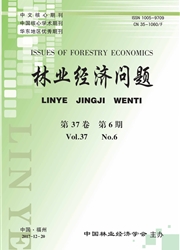

 中文摘要:
中文摘要:
生态旅游发展的复杂性要求人们了解影响其发展效果的各类因素,因此,公共部门逐渐关注相关政策的制定以推动生态旅游发展并进行效果评估。本文的目的在于通过对各阶段中国生态旅游政策的梳理探究中国生态旅游政策的演进特征以及政策演进与生态旅游发展的关系。本文对1994–2016年中央政府及相关部委生的91个生态旅游政策样本统计数据入手,对样本政策的数量与内容结构、政策力度、政策工具以及政策制定部门进行统计分析。结果显示:(1)政策演化中国体现生态旅游发展的目标、内容和方式的转变;(2)政策主题主要围绕生态保护,演进方式为渐进调适;(3)政策工具由微观规制向宏观调控过渡,但未能形成较为完整的政策体系;(4)政策制定部门范畴不断扩大,政策力度值稳步提升。在生态文明建设和《旅游法》实施双重背景下,宏观调控、微观自主是未来生态旅游政策的发展方向,认证标准体系建设是生态旅游政策完善的重点,多部门参与协同是生态旅游政策制定和执行的有力保障,生态旅游发展中的业态融合、利益相关者福利与行为规制、生态旅游发展模式及配套等将是未来中国生态旅游政策关注的重点。
 英文摘要:
英文摘要:
It is widely recognized that the complexity of ecotourism development requires understanding of interrelated factors that influence outcomes and achievements. For this reason, public sectors are increasingly interested in designing policies as driving forces of ecotourism development and exploring policy effectiveness. The purpose of this study is to describe evolutionary characteristics of Chinese ecotourism development and reveal the relationship between policy evolution and ecotourism development. A series of statistical analyses is conducted to explore evolvement characteristics and prospects of Chinese ecotourism policies. Ninety-one sample documents issued by the central government and its departments from 1994 to 2016 are obtained to analyze policy number and content structure, policy intensity, policy tools, and participation of department in policy making. Results show:(1) policy evolution reflects the change of objectives, contents and patterns in Chinese ecotourism development;(2) ecotourism policies stably evolved and adjusted to environmental change, and ecological conservation was core content in policies under a growing number and breadth of policies;(3) ecotourism policy tools transformed from micro-regulation to macro-control, but are not yet systematic;(4) the number of departments involved in policy design continues to increase and the value of policy intensity is rising. In the context of ecological civilization construction and implementation of Tourism Law, macro-control and micro-autonomy is the trend of future ecotourism policies; criteria system improvement may be important tools to regulate ecotourism development; cross-department coordination will act as a guarantee for designing and implementing policies; and welfare of stakeholders, behavioral regulation of tourists and business, and patterns of ecotourism development will be the subject of future policy.
 同期刊论文项目
同期刊论文项目
 同项目期刊论文
同项目期刊论文
 期刊信息
期刊信息
